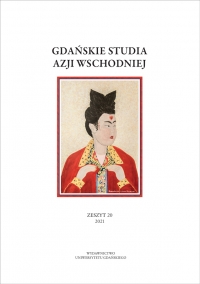Prawna ochrona zwierząt w Chinach. Aspekty filozoficzne i prawne
Abstrakt
Organizations involved in the protection of animals have long indicated the need for changes in Chinese legislation, which, in their opinion, insufficiently protects the welfare of animals (both wild and farmed). This matter has recently been a subject of debate in China itself. Some Chinese scholars point out the negative aspects of the Chinese economic miracle, including the environmental degradation and bad situation and living conditions of livestock and wild animals. Postulates to improve the situation of animals, however, also have their opponents, and one of the more often cited critical arguments is the one about the “extraneousness” of the concept of animal rights and animal welfare in Chinese intellectual culture, and the imposing of “western values” on China.
In the article, I verify the above statement by analyzing the most important Chinese philosophical systems: Taoism, Confucianism and the Chinese type of Buddhism, as well as the Chinese communist thought, in terms of their positions regarding the obligation of humans towards animals. I also analyze changes in the contemporary approach to animal protection and animal welfare, based on the example of the amendment to the Law of the People’s Republic of China on the Protection of Wildlife.
Downloads
Bibliografia
Animal Pretection Index, https://api.worldanimalprotection.org/country/china (dostęp: 15.08.2021).
Blakeley D., Listening to the Animals: The Confucian View of Animal Welfare, „Journal of Chinese Philosophy” 2003, vol. 30.
Cao D., Animal Law and Other Matters: The Need for Intellectual Debates about the Status of Animals in China, Beijing 2008.
Cao D., Animals in China. Law and Society, New York 2015.
Cao D., Confucianism and Daoism Animals in Traditional Chinese Thought [w:] The Routledge Handbook of Religion and Animal Ethics, eds. A. Linzey, C. Linzey, New York 2019.
Carnovale F., Jin X., Arney D., Descovich K., Guo W., Shi B., Phillips C.J.C., Chinese Public Attitudes towards, and Knowledge of, Animal Welfare, „Animals (Basel)” 2021, vol. 11, issue 3.
Changwen X., Xu J., An analytical examination of the animal rights ideas of Buddhism, „Lanzhou Academic Journal” 2007, no. 9.
Chen M., von Keyserlingk M.A.G., Magliocco S., Weary D.M., Employee Management and Animal Care: A Comparative Ethnography of Two Large-Scale Dairy Farms in China, „Animals (Basel)”2021, vol. 11, issue 5.
Chen Z., Emperor Wu of Liang and vegetarian reform in the Buddhist temples: interpreting “On Abstaining from Wine and Meat”, „Journal of Chinese Cultural and Historical Studies” 2013, no. 3.
Chengzhong P., Ethical treatment of animals in early Chinese Buddhism: Beliefs and practices, Cambridge Scholars Publishing, [b.m.] 2014.
Davey G., Z. Wu, Attitudes in China toward the use of animals in laboratory research, „Alternatives to Laboratory Animals” 2007, vol. 35, no. 3.
De Bary W.T., Wing-Tsit C., Burton W., Sources of Chinese Tradition, New York 1960.
Fan R., How Should We Treat Animals? A Confucian Reflection, „Dao” 2010, vol. 9.
Humane Society International, Wildlife markets and COVID-19, Washington 2020.
Koh L., Li Y., Huay Lee J., The value of China’s ban on wildlife trade and consumption, „Nature Sustainability” 2021, vol. 4.
Konstytucja Chińskiej Republiki Ludowej, przekład z jęz. chińskiego W. Lan, M. Dargas, Gdańsk 2012.
Li P., China: Animal Rights and Animal Welfare [w:] Encyclopedia of Animal Rights and Animal Welfare, ed. M. Bekoff, 2nd ed., ABC-CLIO, Santa Barbara 2010.
Li P., Enforcing Wildlife Protection in China: The Legislative and Political Solutions, „China Information” 2007, vol. 21, no. 1.
Li P.J., Animal Welfare in China: Culture, Politics and Crisis, Sydney 2021.
Li X., Zito S., M. Sinclair, C.J.C. Phillips, Perception of animal welfare issues during Chinese transport and slaughter of livestock by a sample of stakeholders in the industry, „PLOS One” 2018, vol. 13(6).
Lu J., Bayne K., J. Wang, Current Status of Animal Welfare and Animal Rights in China, „Alternatives to Laboratory Animals” 2013, vol. 41, issue 5.
Miao Z., Wang Q., Chen D. et al., Current Societal Views about Sustainable Wildlife Management and Conservation: A Survey of College Students in China, „Animals (Basel)” 2020, vol. 10(10).
Miquelle D., Darman Y., Seryodkin I., Panthera tigris ssp. altaica, Cambridge, UK 2011.
Orenstein R., Wildlife markets and COVID-19, „Humane Society International”, 2020, https://bit.ly/3sSrp9E (dostęp: 15.08.2021).
Regan T., Singer P., Animal rights and human obligations, Prentice-Hall 1976.
Shapiro J.R., Mao’s War Against Nature: Politics and the Environment in Revolutionary China, Cambridge 2001.
Sheng X., Zhang H., Weng Q., Traditional Chinese medicine: China’s bear farms prompt public outcry, „Nature” 2012.
Sima Y., O’Sullivan S., Chinese animal protection laws and the globalisation of welfare norms, „International Journal of Law in Context” 2016, vol. 12, issue 1.
Tatlow D.K., Amid Suffering, Animal Welfare Legislation Still Far Off in China, „International New York Times”, 6.03.2013.
Wang J., The evolving regulatory environment [w:] International Animal Research Regulations: Impact on Neuroscience Research – Workshop Summary, eds. D.E. Pankevich, T.M. Wizemann, A. Mazza, B.M. Altevogt, Washington, DC 2012.
Weiming T., Beyond the Enlightenment mentality [w:] Confucianism and Ecology: The Interrelation of Heaven, Earth, and Humans, eds. M.E. Tucker, J. Berthrong, Boston 1988.
Yutang L., My Country and My People, Taipei 1966.

 Uniwersyteckie Czasopisma Naukowe
Uniwersyteckie Czasopisma Naukowe





